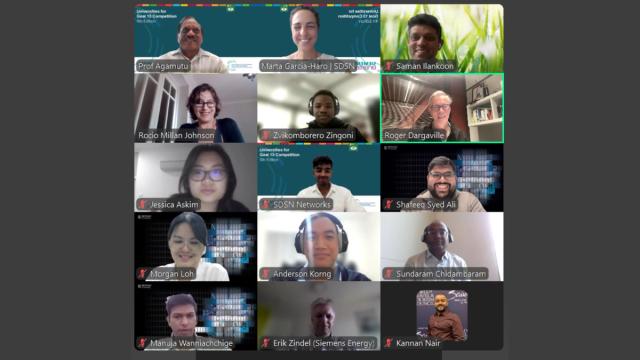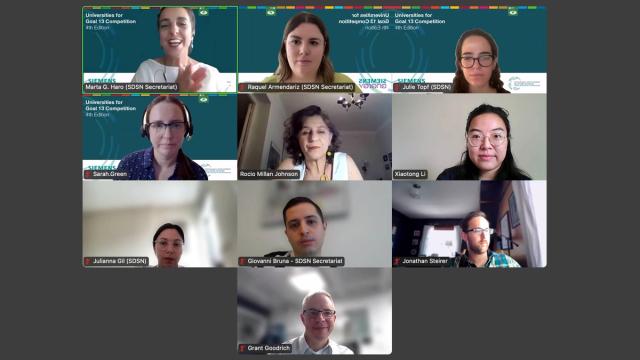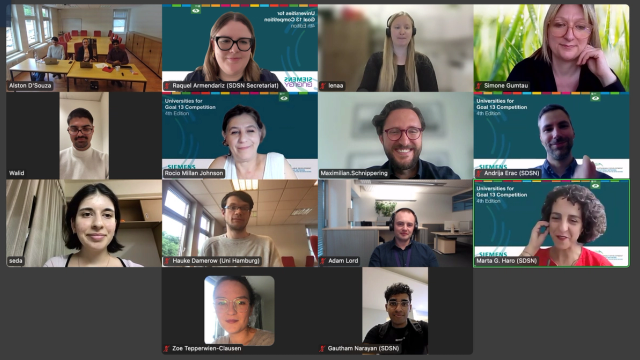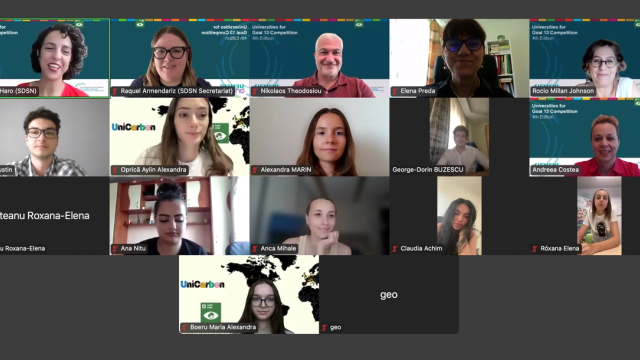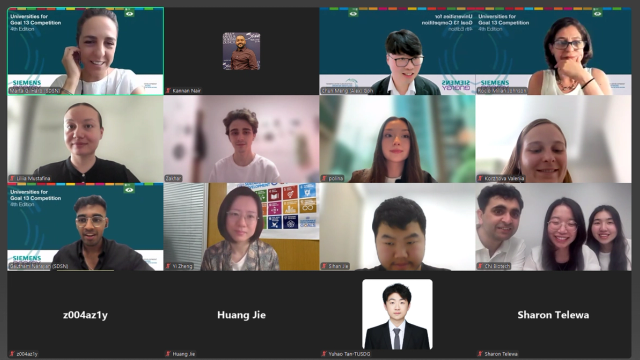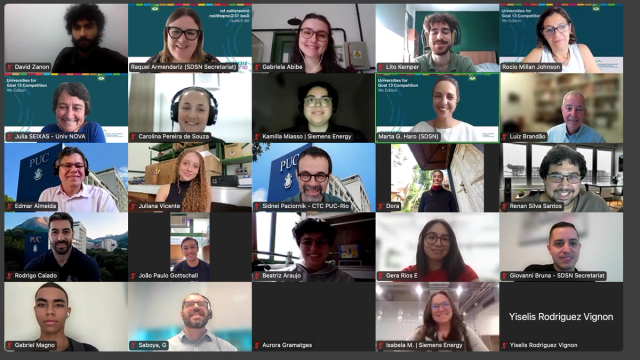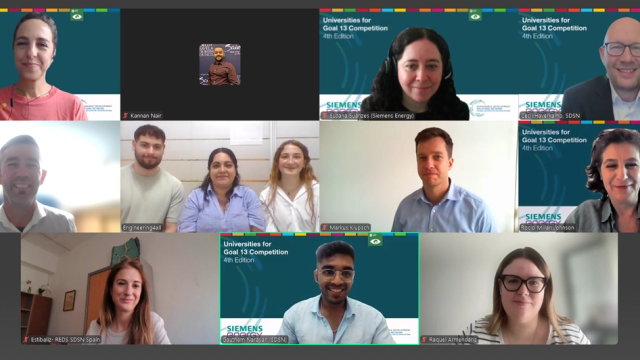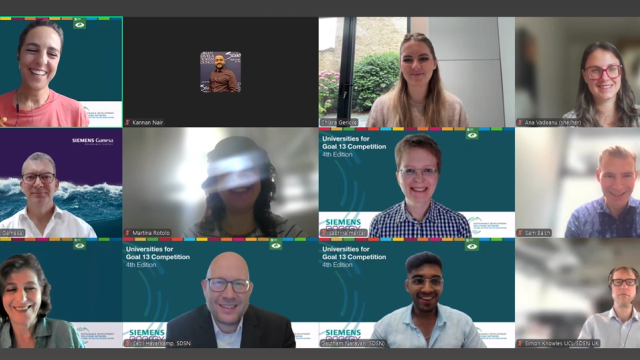Innovating for Impact: Eight Finalist Student Teams Identified for the Universities for Goal 13 Competition
The SDSN and Siemens Energy continue to support young innovators as student teams worldwide showcase their inventive solutions for environmental sustainability in the fourth 'Universities for Goal 13' competition.
From June 17 to 24, 2025, student teams from across the globe participated in the semi-final pitch week of the fourth edition of the "Universities for Goal 13" competition, co-organized by the UN Sustainable Development Solutions Network (SDSN) and Siemens Energy. The competition mobilizes university students to propose practical, multidisciplinary, and collaborative solutions to climate action (SDG 13) and the global energy transition. Launched in October 2024, the fourth edition attracted a broad range of proposals from students eager to make a difference.
Student teams were selected from eight SDSN member institutions: Monash University in Australia, Case Western Reserve University in the USA, Bucharest University of Economic Studies in Romania, University of Hamburg in Germany, SDG China Hub - Tsinghua University in China, PUC-Rio in Brazil, Deusto University in Spain, and University College London in the UK.
A total of 15 projects were submitted, out of which eight were selected to advance to the final round. Over 50 students participated, presenting their final pitches to a panel of energy and sustainability experts from SDSN and Siemens Energy. Evaluation criteria included novelty, feasibility, scalability, alignment with the SDGs, and the quality of both the solution and the presentation.
This year’s projects addressed diverse and pressing challenges: from tackling industrial wastewater using engineered microbes, to hybrid renewable energy systems, maritime anti-fouling innovation, carbon tracking platforms, and sustainable game-based education. The range of ideas reflected students' commitment to building a more sustainable and just future.
These proposals were developed with support from academic faculty and Siemens Energy mentors, who helped teams refine their concepts and presentations. The judges commended the overall quality and creativity of the proposals, which demonstrated deep research, a strong understanding of systems thinking, and realistic approaches to implementation.
Eight Projects Advancing to the Final Round
Turning Algae into the Future of Clean Industry
Led by students from Monash University, this project proposes a high-performance microalgae biorefinery that captures industrial CO₂ emissions and transforms them into valuable products such as astaxanthin and bio fertilizer. Utilizing photobioreactors, anaerobic digestion, and combined heat and power systems, the closed-loop system ensures sustainable and energy-efficient resource use. It supports circular industrial operations and contributes to climate mitigation in heavy-emitting zones.
Focal point: Roger Dargaville, Associate Professor, Monash University
Harwind Hybrid: VAWT + Solar Panel
Developed by Case Western Reserve University students, this hybrid system combines a Vertical Axis Wind Turbine (VAWT) with solar panels, providing consistent, clean energy in off-grid and extreme environments, such as lighthouses and remote research sites. Its compact design includes a braking system and MPPT controller for maximum efficiency.
Focal point: Grant Goodrich, Executive Director, Great Lakes Energy Institute, Case Western Reserve University
Next-Gen Maritime Anti-Fouling
Students from the University of Hamburg introduced a biodegradable, shark-skin–inspired riblet coating that prevents marine biofouling and enhances vessel fuel efficiency. The coating, made using PVA molds and silicone, avoids toxic chemicals and reduces drag, offering both ecological and economic benefits.
Focal point: Simone Gumtau, Education for Sustainable Development Officer, Sustainability Office, University of Hamburg
Unicarbon Platform
This student-led project is a digital platform that helps universities monitor and reduce campus-level carbon emissions in real-time. Featuring dashboards, emissions scorecards, and collaboration tools, it encourages inter-campus competition and student-led climate innovation.
Focal point: Elena Preda, Head of the Research Center for Sustainable Development, Bucharest University of Economic Studies, Romania
C-N Biotechnology
From Tsinghua University, this project uses AI-regulated anaerobic ammonium oxidation (Anammox) with light-responsive photobioreactors to treat wastewater while capturing carbon. The system enhances nitrogen removal and converts CO₂ into valuable bio-products, offering a climate-positive wastewater solution.
Focal point: Zheng Yi, Head of Office, SDG Hub, Tsinghua University
Econopoly
The team from PUC-Rio designed a “phygital” board game that lets players act as energy strategists, balancing clean energy investments, carbon trading, and resource planning. Through gameplay, users learn the dynamics of the energy transition and collaborate to make informed climate decisions.
Focal points: Sidnei Paciornik and Edmar de Almeida, Energy Institute, PUC-Rio
Engineering4All
University of Deusto students proposed initiative tackles gaps in engineering access by mapping future skills, standardizing job roles through ESCO, and informing policy to widen participation. It focuses on digitalization, equity, and alignment with sustainability goals.
Focal point: Aitor Goti Elordi, Associate Professor, University of Deusto, and Ruth Mayoral López, Head of Higher Education Programmes, Euskampus Foundation
Repurposing Micro-Fulfillment Hubs (MFHs)
From University College London, this project repurposes underused micro-fulfillment hubs into community food centers to enhance access to fresh produce in underserved neighborhoods. It offers an alternative to traditional supply chains by linking local producers directly with consumers.
Focal point: Simon Knowles, Head of Coordination - Sustainable Development Goals, University College London
We would like to thank the members of the jury for their time and insightful contributions during the pitch week. The esteemed judges for the 2025 semi-finals were: Prof Agamuthu Pariatamby, Andreea Costea, Andrija Erac, Cecil Haverkamp, Dr. Chun Meng Goh, Henrique Petersen Paiva, Huang Jie, Prof. Julia Seixas, Julie Topf, Maximilian Schnippering, Prof. Nikos Theodosiou, Sabrina Mercer, Sarah Green, Sundaram Chidambaram, and Susana Suanzes.
From now until early September 2025, the finalist teams will continue developing their proposals with support from Siemens Energy mentors and teaching staff. In September, one finalist team will be selected by an international jury and awarded a USD 10,000 prize to support implementation. The final will take place in a hybrid format, and we look forward to showcasing the culmination of these student-led innovations.
